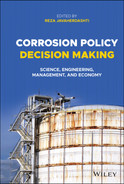Preface
Corrosion Management (CM) has become a very hot topic these days. Many professional groups related to corrosion from the USA to Australia invite their corrosion experts to give lectures/webinars on this topic. There are two common points among all these lectures and webinars; one is that the lecturers speak about how to address corrosion in their own industries and presumably manage it to an audience who are themselves corrosion professionals, and the other is that the invited speakers are always corrosion professionals themselves. Management of matter, that in our understanding is equal to CM, is no less important than management of energy, and therefore it must be explained in such a way that non‐corrosionists also understand and appreciate it. Namely, politicians, non‐corrosionist engineers and professionals, economists and environmentalists must also realize the significance of corrosion and its proper management.
The theme of CM has become so repetitive and predictable that one can envisage almost the entirety of the content: a few words about the economy of corrosion (normally borrowed from figures given in some well‐known websites); a few words about the systems(s) in which corrosion is of interest (or rather, what the speaker has some experience about); how the corrosion has been recognized and addressed technically in these systems; and then the section entitled “Lessons to Learn.”
However, none of these webinars or lectures point out matters which are out of “the box of corrosion”: there are no words about the impact of the thermodynamic nature of corrosion or its management and the difficulties it creates, or how to explain and control ecological measures imposed by corrosion and CM techniques, nor is there anything related to how creativity can be an essential issue in finding solutions for corrosion problems.
This book is first of its kind that looks at corrosion not just as a technical matter but as a multidisciplinary issue that involves many skills and faculties—mainly non‐technical in the sense that engineering literature and nomenclature are considered technical.
In this book we have tried to show that while due to the thermodynamic nature of corrosion, it cannot be stopped. It is necessary to recognize many misunderstandings associated with corrosion (such as the difference between corrosion prevention and corrosion control) and redefine many basic concepts (such as the concept of failure within the context of introducing the terms pseudo‐FFS and Zugzwang effect state) to understand it correctly from a practical point of view that can be called Management.
We would also like to call our approach toward CM “Smart Management of Corrosion” in the sense that it has the capability to adapt itself with all industries, not just a few, and also because management of corrosion benefits from contributions from both CM and Corrosion Knowledge Management (CKM).
We hope our readers will enjoy reading this book as much as we did writing it and applying its principles in our daily professional lives!
